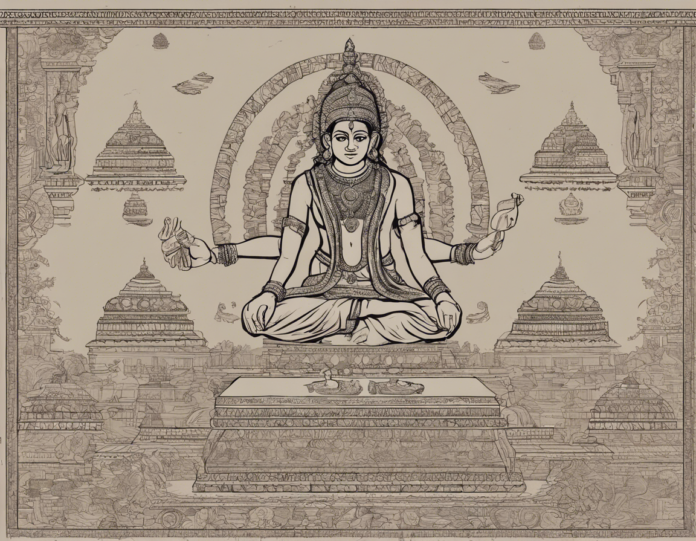Introduction
In modern times, Hinduism is often associated with well-known practices such as yoga, meditation, and festivals like Diwali and Holi. However, behind these popular traditions, there exists a vast array of hidden Hindu practices that are lesser-known yet equally fascinating. These ancient practices have been passed down through generations, holding profound wisdom and spiritual significance. In this article, we will delve into the mystical world of hidden Hindu traditions, unveiling their secrets and shedding light on their importance in the tapestry of Hindu culture and spirituality.
The Science of Ayurveda
One of the oldest holistic healing systems in the world, Ayurveda is deeply rooted in Hindu philosophy. Ayurveda, which means “the science of life” in Sanskrit, emphasizes a balance between the mind, body, and spirit to promote overall well-being. This ancient system includes herbal remedies, diet, meditation, and yoga practices tailored to an individual’s unique constitution or dosha. By understanding the interplay of the three doshas—Vata, Pitta, and Kapha—Ayurvedic practitioners aim to restore harmony and prevent illness.
Vedic Astrology: Jyotish
Jyotish, also known as Vedic astrology, is a profound and intricate system of astrology that originates from ancient texts called the Vedas. Unlike Western astrology, which is mainly focused on psychological traits, Vedic astrology delves into a person’s karma and destiny. By analyzing the positions of celestial bodies at the time of one’s birth, Jyotish can provide insights into various aspects of life, such as career, relationships, and health. Many Hindus consult Jyotish experts to gain clarity and guidance on important decisions and events.
Tantra: The Sacred Rituals
Often misunderstood in the West, Tantra is a spiritual practice that seeks to bridge the gap between the material and the divine. Tantra encompasses a wide range of rituals, including mantra chanting, meditation, visualizations, and symbolic gestures known as mudras. Contrary to popular belief, Tantra is not solely focused on esoteric sexual practices but rather on harnessing the sacred energy within oneself to achieve spiritual enlightenment. Through the practices of Tantra, adepts aim to transcend the limitations of the ego and connect with the universal consciousness.
The Power of Mantra Chanting
Mantras are sacred sounds, words, or phrases that hold spiritual vibrations and are believed to have transformative effects on the practitioner. Chanting mantras is a common practice in Hinduism, with each mantra carrying specific intentions and benefits. For instance, Om is considered the primal sound of the universe, while the Gayatri Mantra is revered for its ability to bestow intelligence and wisdom upon the chanter. Regular chanting of mantras is believed to purify the mind, elevate consciousness, and invoke divine energies for protection and guidance.
The Significance of Sacred Geometry: Yantras
In Hinduism, yantras are intricate geometric diagrams that hold symbolic representations of deity energies. These sacred symbols are used for meditation, concentration, and invoking the presence of deities during rituals. Each yantra is composed of various shapes, such as triangles, circles, and lotus petals, arranged in a precise manner to amplify spiritual energies. By meditating upon a yantra, practitioners can harmonize their consciousness with the cosmic principles embodied by the deity, leading to spiritual growth and realization.
The Art of Vastu Shastra
Vastu Shastra is the ancient Indian science of architecture and design that governs the principles of spatial arrangement and energy flow. Based on the concept of the five elements—earth, water, fire, air, and space—Vastu Shastra guides the construction of homes, temples, and other structures to harmonize with the natural elements and cosmic energies. By adhering to Vastu principles, one can create living spaces that promote health, prosperity, and spiritual well-being. Vastu consultants provide recommendations on spatial layout, directionality, and elemental balance to optimize the energy flow within a space.
Frequently Asked Questions (FAQs)
1. What is the significance of performing puja in Hinduism?
Puja is a ritualistic worship practice in Hinduism that involves offering prayers, flowers, incense, and food to deities. It is a way for devotees to establish a spiritual connection with the divine and seek blessings for health, prosperity, and protection.
2. How does meditation feature in Hindu traditions?
Meditation plays a vital role in Hinduism, with various techniques such as Japa meditation (repeating a mantra), Dhyana meditation (focused concentration), and Kundalini meditation (awakening spiritual energy) being practiced to attain spiritual growth and self-realization.
3. What are the benefits of practicing yoga in the Hindu tradition?
Yoga, derived from the Sanskrit word “yuj,” meaning to unite, aims to harmonize the mind, body, and spirit. Regular practice of yoga postures (asanas), breathing techniques (pranayama), and meditation can promote physical health, mental clarity, and spiritual evolution.
4. How do Hindu festivals reflect the cultural diversity of the religion?
Hindu festivals like Diwali, Navaratri, and Holi celebrate various aspects of Hindu mythology, traditions, and regional customs. Each festival has unique rituals, foods, and decorations that showcase the rich tapestry of Hindu culture.
5. What role do Sanskrit scriptures play in Hinduism?
Sanskrit is considered a sacred language in Hinduism, with ancient texts such as the Vedas, Upanishads, and Bhagavad Gita written in Sanskrit. Studying and chanting these scriptures is believed to impart spiritual wisdom and connect the practitioner to the divine teachings within the texts.
Conclusion
The hidden Hindu traditions discussed in this article reveal the depth and diversity of spiritual practices within Hinduism. From the ancient healing science of Ayurveda to the mystical rituals of Tantra and the auspicious symbols of yantras, these traditions offer profound insights into the interconnectedness of the physical, mental, and spiritual realms. By exploring and embracing these hidden Hindu traditions, individuals can gain a deeper understanding of themselves, the universe, and the eternal truths that transcend time and space.
